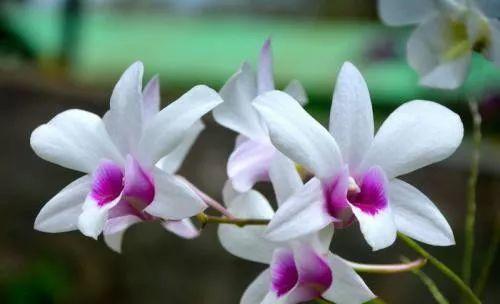Orchid lán, orchid, perennial evergreen herb.

Today we come to know the word [Lan lán].
【Glyph evolution】
The appendix, which is both a sound side and a shape side, is the omission of "欄", that is, the small gate in front of the gate. Lan, seal (草) (阑, "欄", fence), denotes vanilla hanging on the gate. Original meaning: noun, a perennial vanilla that the ancients hung on the small gate, born in the wetlands of the mountains, the flowers are purple-red, and their stems, leaves, and flowers have a slight fragrance. The ancients hung vanilla in their residences to wake up and relax, repelling mosquitoes and seeking good fortune. The Lishu simplifies the seal "艸" to "艹". The colloquial script is partially simplified according to the cursive glyph: the "grass head" in the cursive glyph (orthographic italic script is), the "two" is transformed from the "door" in the cursive glyph (the orthographic italic is), and the "Cambodian" in the cursive glyph is omitted. The simplified word "lan" means "grass on the door".
【Calligraphy Masters】
【Definition of words】
〈Name〉
(Shape sound.) From the 艸, the diaphragm (lán) sound. Meaning: orchid, i.e. Zeeland)
Heng Lan Zhiruo. - "The Biography of Sima Xiangru of the Book of Han"
The root of the orchid is for Zhi. - "Xunzi Persuasion"
orchid. Orchidaceae. Perennial evergreen herb. ornamental plants.
A generic term for plants of the genus Orchid.
Ancient finger Magnolia .
Weapon rack
The arsenal is forbidden to soldiers, and the land is set up. --Han · Zhang Heng", "Xijing Fu"
【The Story of the Word】
Seven songs from the military, four of them
Tang Wang Changling
Qinghai Changyun Dark Snow Mountain, isolated city looking at Yumen Pass.
Huangsha wears golden armor in hundreds of battles, and does not break the Loulan and will not return it.
Translation: The clouds on Qinghai Lake are thick, and the snow-capped mountains are bleak. The ancient city of Biansai, Yumen Xiongguan, is thousands of miles away and looks at each other in the distance. The soldiers who guard the border, who have experienced hundreds of battles, wear through their armor, have unquenchable ambitions, do not defeat the invading enemy, and vow not to return to their hometown.
Interpretation: During the Tang Dynasty, the national strength was strong, the monarch was determined to forge ahead, the border was expanded, and people were eager to emerge and make a difference in this era. The warrior sprinkled a passion for the battlefield to make a meritorious achievement, and the poet was infected by the great spirit of the times, and used his majestic and tragic pride to compose a majestic, magnificent and magnificent poem. "Seven Songs from the Army" is a kind of border poem written by the Sheng Tang poet Wang Changling using the old inscription of Lefu.